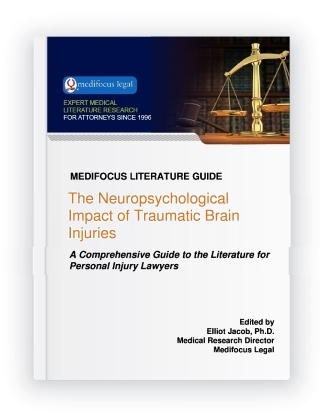The Neuropsychological Impact of Traumatic Brain InjuriesA Comprehensive Guide to the Literature for Personal Injury Lawyers
Publisher: Medifocus Legal
Publication Date: January 6, 2026
Number of Pages: 123
A Comprehensive Guide to the Literature for Personal Injury Lawyers
Publisher: Medifocus LegalPublication Date: January 6, 2026
Number of Pages: 123
neuropsychological impacts.
One of the primary concerns following a TBI is cognitive impairment. Depending on the location and extent of the injury, individuals may experience difficulties with attention, memory, and executive functions such as problem-solving and decision-making. These cognitive deficits can interfere with daily activities, academic or occupational performance, and social interactions, leading to a decreased quality of life.
TBIs can also profoundly affect emotional and behavioral functioning. Many individuals report experiencing mood disturbances such as depression, anxiety, irritability, and impulsivity following a TBI. These emotional changes may be attributed to both biological factors, such as alterations in neurotransmitter levels, and psychosocial factors, including the stress of coping with injury-related challenges.
In addition to cognitive and emotional consequences, TBIs often manifest in physical symptoms such as headaches, dizziness, and fatigue. These somatic complaints can exacerbate cognitive difficulties and contribute to overall distress and functional impairment.
Importantly, the neuropsychological impact of TBIs is not limited to the immediate aftermath of the injury. Research suggests that individuals may experience long-term sequelae, including persistent cognitive deficits and an increased risk for developing neurodegenerative conditions such as dementia and Alzheimer's disease.
Medical and scientific literature plays a significant role in litigating cases involving a traumatic brain injury. The MediFocus Literature Guide to The Neuropsychological Impact of Traumatic Brain Injuries is a comprehensive reference guide to the medical literature designed to help personal injury lawyers develop an in-depth understanding of the often significant cognitive and behavioral consequences of traumatic brain injures. This objective is accomplished by a thorough review of the peer-reviewed medical literature published over the past decade as documented from case reports, cohort studies, and major topical review articles.
The MediFocus Literature Guide to The Neuropsychological Impact of Traumatic Brain Injuries is available both as a soft-cover book and as a PDF download. Order your copy today. Please see the side panel for more information.
 |
- A comprehensive bibliography of 230 journal article references indexed in MEDLINE published in well respected medical and scientific journals.
- Online access to the abstracts (summaries) of the articles.
- Online access to the free full-text version of 31 articles.
- Links to full-text sources of other articles that are available for purchase directly from individual journal publishers.
- A unique "Author Directory" consisting of the names and institutional affiliations of experts who have published and have specialized knowledge about The Neuropsychological Impact of Traumatic Brain Injuries. The "Author Directory" is a valuable resource for quickly identifying and locating experts for case reviews, opinions, and testimony.
Select examples of topics that are covered by the articles referenced in this Guidebook include:
- What traditional neuropsychological assessment got wrong about mild traumatic brain injury: the added value of advanced neuroimaging.
- Impact of physiological and neuropsychological function on quality of life in traumatic brain injury patients.
- The Role of Neuropsychology in Traumatic Brain Injury: Comprehensive Literature Review.
- Neuropsychological and neuropsychiatric recovery from mild traumatic brain injury.
- Volumetric MRI Findings in Mild Traumatic Brain Injury (mTBI) and Neuropsychological Outcome.
- Neuropsychological Performance and Functional Capacity Following Mild Traumatic Brain Injury in Veterans.
- Neuropsychological and neuropsychiatric recovery from mild traumatic brain injury
- Neuropsychological recovery during the first 12 months after severe traumatic brain injury: A longitudinal study with monthly assessments.
- Post-Traumatic Stress Disorder Is Associated with Neuropsychological Outcome but Not White Matter Integrity after Mild Traumatic Brain Injury.
- The Role of Neuropsychology in the Evaluation of Concussion.
- Quality of return to work in patients with mild traumatic brain injury: a prospective investigation of associations among post-concussion symptoms, neuropsychological functions, working status and sta
- Predictors of neuropsychological outcome after pediatric concussion.
- Long-Term Cognitive and Neuropsychiatric Consequences of Repetitive Concussion and Head- Impact Exposure.
- Neuropsychological Outcomes in Patients with Complicated Versus Uncomplicated Mild Traumatic Brain Injury: 6-Month Follow-Up.
- Neuropsychological Testing in Mild Traumatic Brain Injury: What to Do When Baseline Testing Is Not Available.
- Neuropsychological Assessment Following Concussion: an Evidence-Based Review of the Role of Neuropsychological Assessment Pre- and Post-Concussion.
- Neuropsychological outcome and its correlates in the first year after adult mild traumatic brain injury:
- Diffusion Tensor Imaging Parameters in Mild Traumatic Brain Injury and Its Correlation with Early Neuropsychological Impairment: A Longitudinal Study.
- Neuropsychological and neurophysiological evaluation of cognitive deficits related to the severity of traumatic brain injury.
- Neuropsychiatry of persistent symptoms after concussion.
is available in two formats: | |
Order by Phone:To order by phone, please call: Order by Mail:To order by mail, please print and complete this Order Form | |

